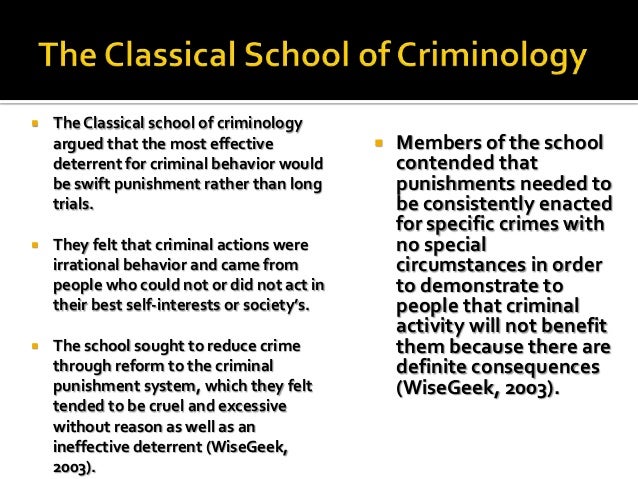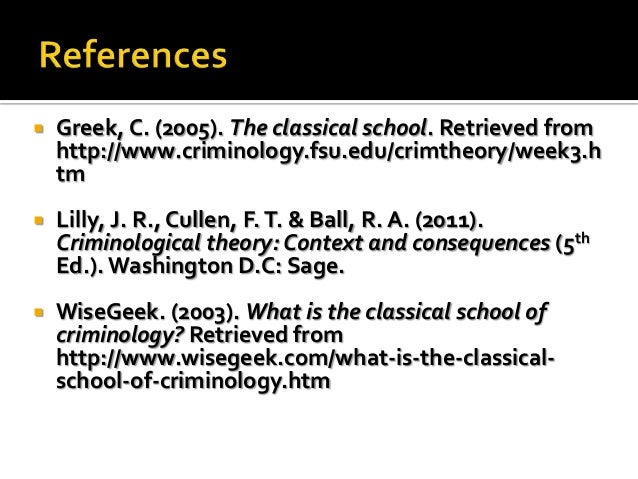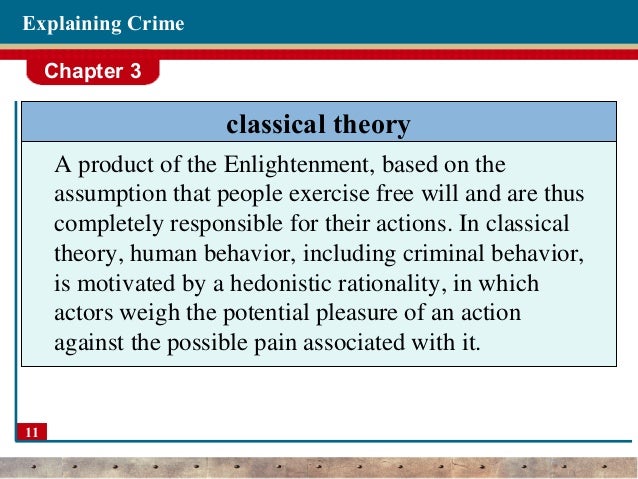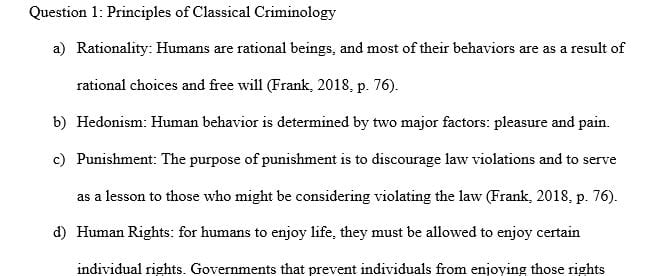What is classical criminology

Bibliography I. Introduction Classical criminology usually refers to the work of 18th-century philosophers of legal reform, such as Beccaria and Bentham, but its influence extends into contemporary works on crime and economics and on deterrence, as well as into the rational choice perspective.

The entire range of social phenomena can be understood more or less accurately using models of economic transactions and the assumption that people make rational choices between opportunities to maximize their own utility. This was a foundational assumption of classical criminology.

Sociological theory viewed crime through economic models, and this assumption is called rational choice theory. For criminologists, rational choice theory has origins in sociological theoretical thought and in various perspectives on economics and markets, but, more prominently, its influences are found in the classical school of criminology.
What is classical criminology?
Rational Choice Theory and Get-Tough Policies Drawing on the classical contention that man is a calculating creature, rational choice criminology begins with the assumption that behaviors of groups and individuals will reflect attempts to maximize pleasure and minimize pain.
Theorists in this tradition hypothesize how varying conditions shaping the payoff of an endeavor in combination here varying what is classical criminology and desires will contribute to aggregate and individual levels of crime.
Most adherents agree that the utilities, or desirability, of activities are varying and subjective, so that crime may have attraction for some people that is not seen by others.

There also is widespread agreement that the strength and quality of individual or group preferences can be taken into account in studying the occurrence of criminal behavior. Therefore, in criminology rational choice theory usually is a variant of expected utility theories and portrays the process of considering or ignoring criminal opportunities as part of a rational calculation based in part on subjective assessments wherein the expected costs and benefits of actions are considered. It was often portrayed as a reductionist and simplistic theory due to the fact that proponents often emphasized the most obvious what is classical criminology and benefits of crime commission, such as monetary payoff versus terms of imprisonment.
I. Introduction
Moreover, its foundational assumptions sometimes are critiqued for being so broad as to be meaningless. What is classical criminology very recent years, however, the theory what is classical criminology attracted investigators drawn by its potential for making clear sense of why people commit crime and its ability to communicate the theoretical reasons behind research results to any audience. In contemporary forms, it also can conveniently integrate structural and perceptual models of offending, and the perspective easily makes sense of the use of a wide array of variables from multiple levels of analysis. The rational choice framework has great capacity for incorporating knowledge and techniques garnered from across the social sciences, because its central premises are extremely broad and conflict directly with few extant statements from other perspectives.
In broad form, the rational choice perspective has as much potential for integrating knowledge from various spheres of criminology as does any other grand theory.
Post a Comment for "What Is Classical Criminology Definition"
For all its shortcomings, which derive mainly from economic assumptions about human and aggregate decision making and the tendency to focus on the most tangible variables, it makes efficient sense of complex questions. Accompanying a more even-keeled political approach and more rigorous empiricism in criminology than was prevalent in more ideologically combative times has been a realization that there is nothing necessarily punitive in classical or rational choice theory and that therefore the perspectives should not be faulted when it is misapplied or misunderstood.

Articles framed by the perspectives usually examine the possibility that punishment reduces crime, and often that is found what is classical criminology be the case in at least some examined conditions. However, for people who would use the perspectives as ideology to support getting tough on crime, the approach has as many inherent inconsistencies as convergences.
Contemporary versions of rational choice specify countless complications of simple postulated relationships between increased punishment and decreased crime, for example. There clearly the rational choice tradition acknowledges that there are limited conditions under which one should expect punishment increases to lead to reductions in rates of crime or to impede individual decisions to commit crime.]
Share: What is classical criminology
| What is classical criminology | Thesis writers |
| What is classical criminology | Sane or insane whos to know mental illness |
| What is classical criminology | Conflict is rarely resolved |
| Enzyme Concentration Lab Report | In criminology, the classical school usually refers to the 18th-century work during the Enlightenment by the utilitarian and social-contract philosophers Jeremy Bentham and Cesare Beccaria. Jul 27, · Classical criminology is a theory based on the principle that all people criminals included are rational and have the complete ability to make their own choices. Originating in the 18th century and rooted in philosophical utilitarianism it sees man as a rational . Jul 09, · Classical criminology is a label applied to a series of writings from the late eighteenth to early nineteenth centuries that paved the way for penal reform in Europe. The key authors were Cesare Beccaria and Jeremy Bentham, whose work radicalized the understanding of crime and punishment. |
What is classical criminology - speaking
What are the shortcomings of the classical school of criminology? The shortcomings of the classical school of criminology are the lack of attention given to the motivation to commit crimes. You may ask, What is the difference between positivism and the classical school of criminology? The key idea behind this theory was to use scientific methods to understand criminality and crime. The major difference between the two theories are that classical school is mainly based on free will and suggests that crime as a choice, whereas positivism criminology argues that crime is not a choice.
Leadership And Cinematic Themes Of The Film
2022-03-30
Mazugul
Excuse for that I interfere … At me a similar situation. I invite to discussion. Write here or in PM.
Stages Of Learning
2022-04-01
Shacage
I can not take part now in discussion - there is no free time. I will be free - I will necessarily express the opinion.
differences between egypt and mesopotamia
2022-04-03
Shaktitaxe
What words... super, a brilliant phrase
proofreading service online
2022-04-05
Kagahn
In my opinion you commit an error.
Strengths And Weaknesses Of A Group
2022-04-06
Nami
Sounds it is tempting

Category
Best Posts
- how does perception affect the organizational process education essay
- medicine and thesis statement
- thesis service
- Untranslatability Essays
- buy college application essays
- the opinions of the renaissance and reformation
- salary is not the most important factor in motivating employees
- Education System In Michael Manns Idiot Nation
- macbeth essay example
- social networking sites 171347
- Oxycontin Abuse
- cultural assimilation and american music artists
- catherine of aragon quotes
- Media Literacy Is Not Just Important
- Listen To Me The Definition Of Love
- compare and contrast 5 2






 463
463